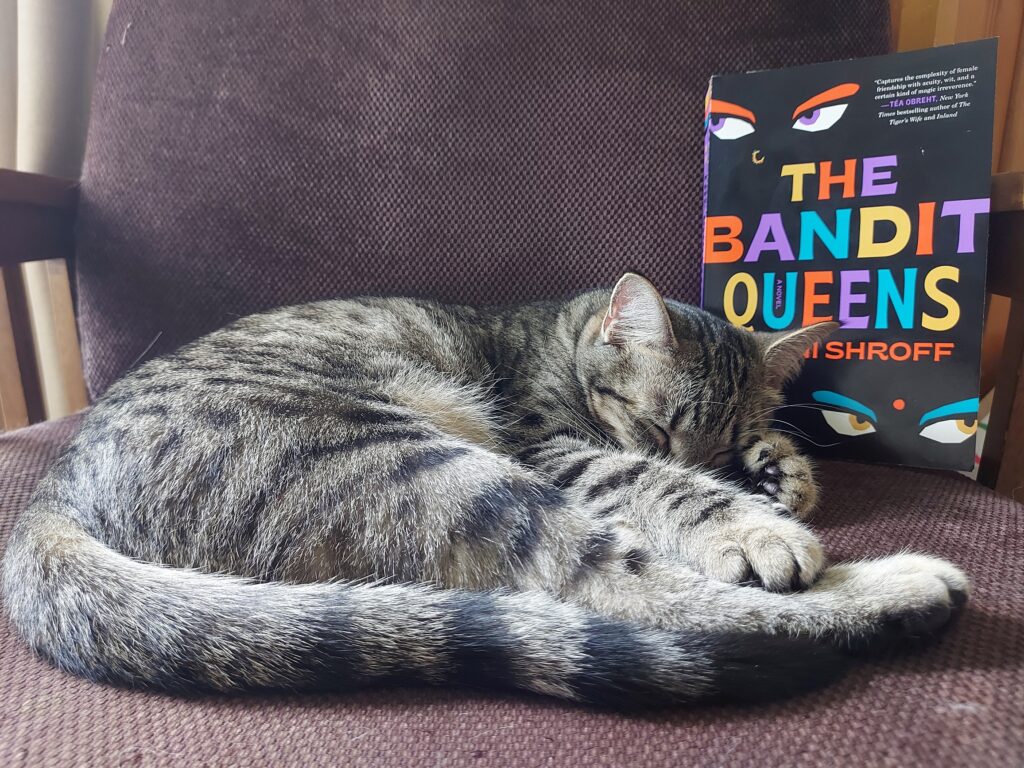The Bandit Queens by Parini Shroff

A few books ago I reviewed Bookworm by Robin Yeatman, a novel about a woman fantasizing about and then actively trying to kill her husband, and I did not think the novel worked because the protagonist was neither sympathetic nor entertaining. Parini Shroff’s The Bandit Queens is about more than one woman trying to kill her husband, but unlike Bookworm, it works on multiple levels. The women are sympathetic characters. The husbands they want to kill are truly despicable. The novel, if not quite laugh-out-loud funny, is humorous. But most importantly, The Bandit Queens critically examines gender roles in India and the challenges women face to subvert them.
The protagonist of The Bandit Queens is Geeta, whose husband walked out on her five years ago. Geeta has no idea what happened to her husband, but the other members of her small Indian village think that she made him disappear, and so they are afraid of her and keep their distance. Geeta is childless and parentless, and now husbandless, so she lives alone in a tiny shack. She earns a living by making jewellery, and dreams of one day having enough money to buy a refrigerator (although this novel is set in the present, in rural Indian only the wealthiest families have indoor plumbing and refrigerators, although the frequent blackouts make owning a refrigerator almost pointless).
Geeta, although only in her 30s, has accepted her ostracization by the village and her role as the village “witch”. The only time she gets involved with other people is when she meets with the members of her microloan group, which includes her former best friend, Saloni. But then one day another member of her loan group, Farah, who is regularly beaten by her alcoholic husband, asks for Geeta’s help with killing her husband, just like how Geeta presumably killed her own husband.
Geeta is a curiously complicated character. Her own husband was abusive, so she is not sorry that he is gone. She is not oblivious to the power imbalance in India where men can pretty much get away with doing what they want to women: They beat their wives and children, they rape innocent young girls, especially those girls who are of a lower caste, and they punish women for rejecting them by throwing acid in their faces. Women have little to no recourse against men, so can women be blamed for taking matters into their own hands? A hero of Geeta’s is the real-life Bandit Queen, Phoolan Devi, who was repeatedly raped until she decided to punish her rapists. She spent some time in jail before becoming a Member of Parliament, and she was assassinated in 2001. Geeta wants to be like the Bandit Queen and punish abusive men. She wants to make positive changes to her village, and challenge societal norms, such as the racist caste system with the “untouchables” on the bottom.
But Geeta is also a somewhat selfish person who does not want to get involved until it directly affects her. She at first rebuffs Farah’s plea for help, but then when she overhears Farah’s husband talking about blackmailing Geeta, she decides to help Farah after all. It turns out for all her bravado, Geeta does not really have the stomach for murder, which is when the story starts to become humorous, especially when Geeta and Saloni rekindle their friendship, and other wives come out of the woodwork asking for Geeta’s help.
The Bandit Queen is not a radically feminist book that blames just men for all the world’s evils. As Geeta becomes more involved with the other people in her village, she realizes that women can be just as dangerous as men, and that not all men are monsters. Even though I have recently read two books now on the subject of murdering one’s husband, it really is not a subject that I relish (I swear), but I enjoyed this novel for the growth in Geeta’s character, who starts out naïve but learns some hard truths along the way that make her a better person, and because Shroff has managed to infuse so much wit into an otherwise heavy topic.